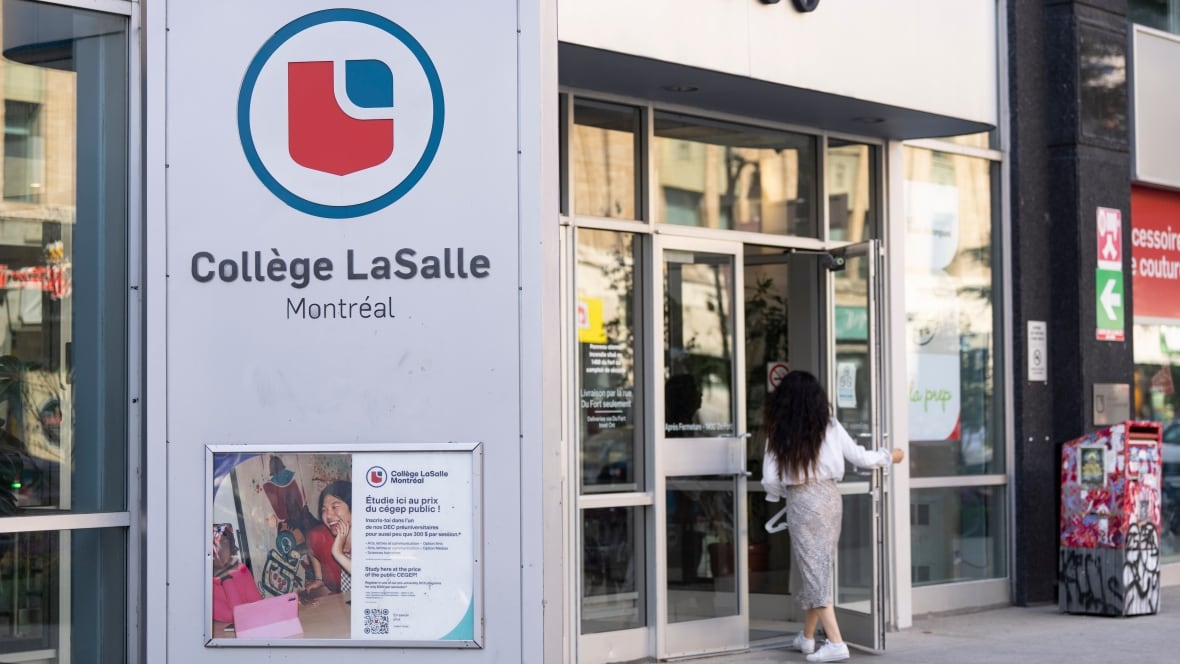Education
LaSalle College Students Face Uncertainty as Status Changes

Students at LaSalle College in Montreal are grappling with sudden changes to their academic status as the institution attempts to align with Quebec’s language reform mandates. Less than a month before the beginning of classes, approximately 90 students, including those pursuing vocational diplomas known as AEC programs, have been shifted from full-time to part-time status.
Alex Abraham, a 33-year-old student on the verge of entering his final year in network management, expressed his dismay at the college’s last-minute decision. “I was shocked,” he stated, reflecting on the email he received last week. “We all came here with lots of expectations and dreams.” Under the new part-time status, students like Abraham lose access to Canada’s post-graduation work permit and are restricted from working off-campus unless they meet specific criteria. The change would force Abraham to leave the factory job he relied upon for financial stability.
In an official statement, LaSalle College explained that the adjustments are necessary to comply with the Charte de la langue française and the government-imposed quotas on English-language AEC programs. The college’s spokesperson, Caroline Gervais, emphasized that the decision only affects the upcoming fall semester.
Financial Penalties and Compliance Challenges
The landscape for English-language education in Quebec has shifted dramatically following the passage of Bill 96, which imposes stricter enrollment limits. During the 2024-25 academic year, LaSalle College exceeded its enrollment quota for English programs by 1,066 students, resulting in a fine of $21,113,864. This fine compounded an already significant debt of $8.7 million from the previous year, bringing the total amount owed to nearly $30 million. The college is currently contesting these fines in a civil suit in Quebec’s Superior Court.
According to the college’s lawsuit, about 70 percent of students enrolled in English-language AEC programs are from overseas, including Abraham, who learned about LaSalle through an agency while living in India. “The standard of living is good here in Canada compared to India,” he remarked. “We are all putting in the effort to learn the [French] language and also trying to build a career here.”
Despite being aware of the college’s financial challenges, Abraham did not anticipate the abrupt alteration to his full-time status. Gervais explained that various factors, including student performance and altered academic pathways, contributed to the changes. “This does not mean that LaSalle College exceeded its overall AEC quota,” she clarified. “Instead, it reflects the constraints of the respective capacity of AEC and DEC programs within those quotas, combined with scheduling realities.”
Seeking Answers and Support
The office of Higher Education Minister Pascale Déry declined to comment, citing ongoing legal proceedings. LaSalle College indicated that many affected students had either failed classes or changed their academic paths, though neither of these circumstances applied to Abraham. He expressed frustration at being included among those impacted, feeling the decision was arbitrary.
To provide clarity, the college has arranged a meeting for affected students with representatives from Immigration Canada and the institution itself. Abraham is hopeful that this meeting will yield answers to his concerns. “I have the right to know the reason,” he stated. He expressed dissatisfaction with the possibility that the college was simply avoiding further fines. “I am not the reason for the fine. They did the wrong thing; they violated the rule.”
As LaSalle College navigates the complexities of compliance and student needs, the impact on students like Abraham raises significant questions about the future of English-language education in Quebec.
-

 Science1 week ago
Science1 week agoMicrosoft Confirms U.S. Law Overrules Canadian Data Sovereignty
-

 Technology1 week ago
Technology1 week agoGoogle Pixel 10 Pro Fold Specs Unveiled Ahead of Launch
-

 Technology1 week ago
Technology1 week agoWorld of Warcraft Players Buzz Over 19-Quest Bee Challenge
-

 Science5 days ago
Science5 days agoChina’s Wukong Spacesuit Sets New Standard for AI in Space
-

 Health6 days ago
Health6 days agoRideau LRT Station Closed Following Fatal Cardiac Incident
-

 Science1 week ago
Science1 week agoXi Labs Innovates with New AI Operating System Set for 2025 Launch
-

 Lifestyle6 days ago
Lifestyle6 days agoVancouver’s Mini Mini Market Showcases Young Creatives
-

 Science1 week ago
Science1 week agoInfrastructure Overhaul Drives AI Integration at JPMorgan Chase
-

 Technology1 week ago
Technology1 week agoHumanoid Robots Compete in Hilarious Debut Games in Beijing
-

 Top Stories1 week ago
Top Stories1 week agoSurrey Ends Horse Racing at Fraser Downs for Major Redevelopment
-

 Technology1 week ago
Technology1 week agoNew IDR01 Smart Ring Offers Advanced Sports Tracking for $169
-

 Health6 days ago
Health6 days agoB.C. Review Urges Changes in Rare-Disease Drug Funding System
-

 Technology5 days ago
Technology5 days agoDragon Ball: Sparking! Zero Launching on Switch and Switch 2 This November
-

 Business6 days ago
Business6 days agoCanadian Stock Index Rises Slightly Amid Mixed U.S. Markets
-

 Science1 week ago
Science1 week agoNew Precision Approach to Treating Depression Tailors Care to Patients
-

 Technology1 week ago
Technology1 week agoGlobal Launch of Ragnarok M: Classic Set for September 3, 2025
-

 Technology1 week ago
Technology1 week agoFuture Entertainment Launches DDoD with Gameplay Trailer Showcase
-

 Education5 days ago
Education5 days agoParents Demand a Voice in Winnipeg’s Curriculum Changes
-

 Technology1 week ago
Technology1 week agoInnovative 140W GaN Travel Adapter Combines Power and Convenience
-

 Business1 week ago
Business1 week agoNew Estimates Reveal ChatGPT-5 Energy Use Could Soar
-

 Health5 days ago
Health5 days agoRideau LRT Station Closed Following Fatal Cardiac Arrest Incident
-

 Business5 days ago
Business5 days agoAir Canada and Flight Attendants Resume Negotiations Amid Ongoing Strike
-

 Health1 week ago
Health1 week agoGiant Boba and Unique Treats Take Center Stage at Ottawa’s Newest Bubble Tea Shop
-

 Business1 week ago
Business1 week agoSimons Plans Toronto Expansion as Retail Sector Shows Resilience










